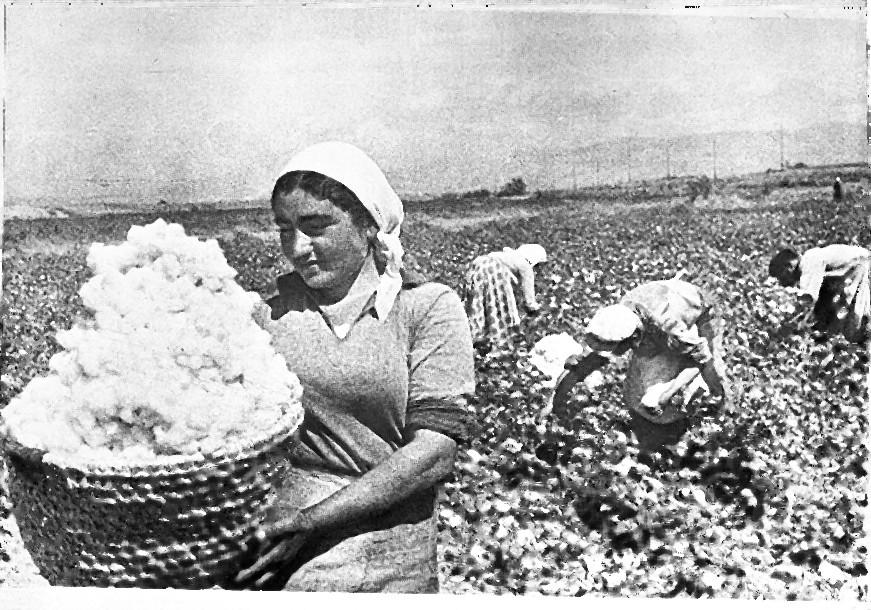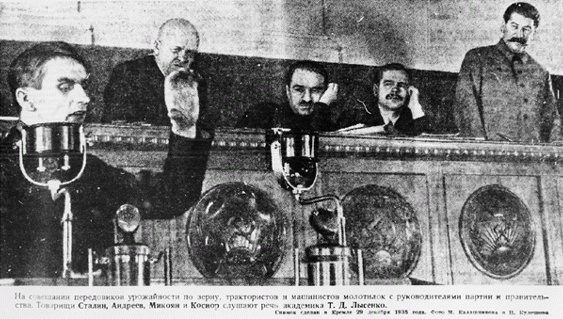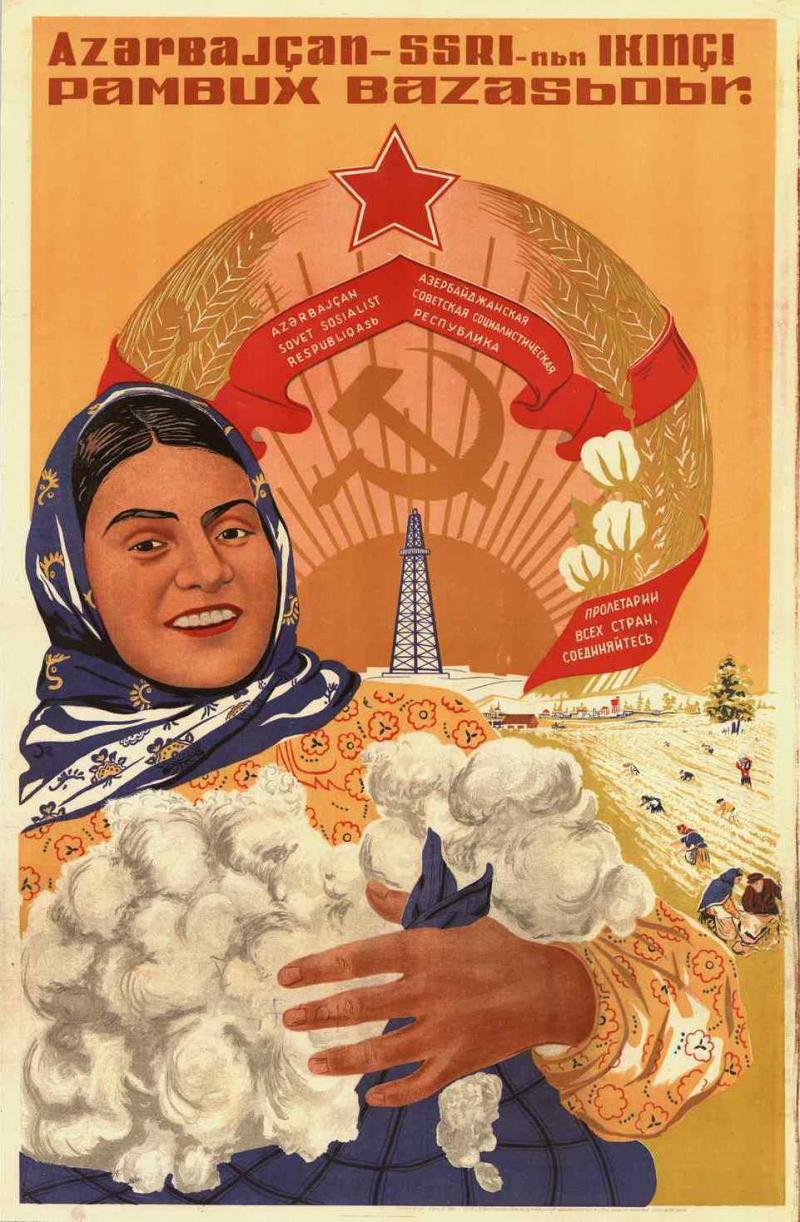PBS: Escaping Eritrea … [Read More...] about ካብ ውሽጢ ቤት ማእሰርታት ኤርትራ
What the Reappraisal of Soviet Russia’s Top Agricultural Mastermind Says About Putin’s Russia
Loren R. Graham |

The discredited Soviet scientist Trofim Lysenko is enjoying a reappraisal in Russia these days. Lysenko was once the Soviet Union’s top agricultural mastermind, supported by Joseph Stalin himself. Even at the height of his power, however, Lysenko’s controversial theories on how plants and animals genetically adapt to their surroundings were dismissed by most of his peers. Yet Lysenko’s political influence was so great that he managed to have many of his rivals killed. His pseudoscience thus dominated Soviet academia for decades—causing profound damage to Russian research and agricultural production.
Former Soviet leader Nikita Khrushchev first allowed scientists to criticize Lysenko in 1958, but kept him in power despite his detractors. But when Khrushchev was deposed in 1964, Lysenko lost his political benefactor, and was deposed as the director of the Russian Institute of Genetics the next year. Now, however, a wave of Russian activists and scientists has begun to reevaluate his legacy. These supporters claim that the new field of epigenetics, which studies how environment can alter the expression of genetic traits, is validating much of Lysenko’s research. They also accuse the West of deliberately tarnishing Lysenko’s legacy in order to diminish Russia’s contributions to the study of genetics. In fact, it is these activists who are damaging Russia’s contribution and reputation, as well as its understanding of its own Soviet past. Desperate to wean Russia from its reliance on foreign technology, President Vladimir Putin hopes to turn Russia into a research haven. He’ll never succeed, however, unless he prevents his countrymen from playing politics with science.
PEER REVIEW
Lysenko’s scientific career began in 1921 in Ukraine, at the Kiev Agricultural Institute, where he studied the effects of temperature variation on the life cycle of plants. Lysenko was able to boost crop outputs through a process he called vernalization, which caused plants to grow faster due to exposure to cold temperatures. Vernalization, however, was neither new nor revolutionary, as German scientists had employed the practice since the eighteenth century. Nevertheless, his results won him Moscow’s attention in the late 1920s, and he soon gained the trust of Russia’s political elite. In 1940, Stalin appointed Lysenko to direct the Soviet Union’s Institute of Genetics, directing him to reinvigorate the country’s farming system. Stalin’s collectivization policies had led to widespread famine; to feed the country, Lysenko had to implement his theories quickly.

Lysenko believed, as he wrote, that the “internalization of environmental conditions” could force plants to evolve in different direction than that dictated by their inherited genes. It therefore followed that farmers should be able to plant crops out of season, since doing so would force their genes to adjust to the different weather conditions. Lysenko’s claims directly contradicted the work of famous biologist Gregor Mendel, as well as a half-century of subsequent research that had demonstrated how genes are responsible for creating biological adaptations. His experiments often failed to produce the results he boasted, and few other researchers could replicate them successfully. Given the dire state of the Russia’s agricultural system, however, Soviet scientists did not have enough time to test Lysenko’s theories before implementing them. So Lysenko used his power as president of the Academy of Agricultural Sciences to push Russian farmers to adopt unfounded practices, such as digging crops deeper into the ground to produce better yields, and plucking leaves from cotton plants to spur their growth.
Not that they liked doing so. Russia’s established geneticists denounced Lysenko’s theories, but were overruled by Moscow. In fact, thousands of biologists were sent to prison or killed for criticizing Stalin’s favorite scientist, and genetic research all but stopped in Russia until the dictator’s death in 1953. At that point, Lysenko’s ideas began to fall out of favor as Khrushchev permitted scientists to speak out against him. The Party would not remove Lysenko from power for another 12 years, until they eventually stripped him of his position and restricted him to an experimental farm in Moscow’s Lenin Hills district. By the time Lysenko died in 1976, his theories had been fully discredited within the Soviet Union.
REVISE AND RESUBMIT

Lysenko’s skeptics were silenced for decades, fearful of the autocratic scientist’s direct connections to Stalin. But Khrushchev’s reforms provided scientists with an opportunity to voice their dissent against Lysenko in 1962, when prominent Soviet physicists Vitaly Ginzburg, Pyotr Kapitsa, Yakov Borisovich Zeldovich published a damning report of Lysenkoism. The article was published during a period of upheaval in the Soviet political system, in which many ideological figures were purged from power. The press followed suit, publishing numerous articles indicting Lysenko’s methods, and calling for a restoration of accurate scientific practices within the country. In the decades following Lysenko’s fall from grace, no one in Russia challenged his reputation as a fraud. But the advent of epigenetics, a discipline that began to emerge in the late 1990s in the United States, has recently led some Russians to reassess his legacy. Epigenetics challenges a major foundation of modern genetics—namely, the theory that events experienced in one’s lifetime cannot influence inheritance unless they alter the DNA sequence itself. Scientists have discovered that some external factors, such as exposure to traumatic experiences, can in fact make DNA act differently without changing its code. Limited studies suggest that it could be possible for these traits to then become inheritable, but more work needs to be done in this area. Some Russian nationalists have taken this finding as a validation for Lysenko’s work, however, and a new wave of supporters are now working to revise his place in Soviet history.
Russia’s government has also weighed in. In 2014, the Federal Agency on the Press and Mass Communication, which oversees the nation’s publishing industry, subsidized the publication of a pro-Lysenko book that claimed to expose the world’s ideological war on biology. The book contained many of the standard arguments used by Lysenko’s supporters, but its government financing caused Russian academics to worry that Lysenkoism could soon get Moscow’s official approval once again. More troubling is the publication of a pro-Lysenko biology textbook by nationalist groups in 2012 who are now pushing for its adoption in Russian grade schools.
Fortunately, Lysenko’s revival poses little real risk to Russia’s scientists. Putin may have a distressing amount of control over many aspects of Russian life, but so far his influence has not extended to scientific policy. The Communist Party of Lysenko’s era controlled every university, research institute, academic journal, and newspaper. This made it easy to impose a particular biological theory on the country. Today, by contrasts, Russian scientists work closely with Western colleagues and travel frequently to conferences outside the country. Russian companies will never be able to compete with Western biotech firms if their scientists a forced to adopt an antiquated and disproved theory of genetics. In other words, the chance of Moscow readopting Lysenkoism is slim.
The real fear is that Lysenko’s supporters will influence popular perceptions in Russia, both of science and failed Soviet-era policies. Conflating pseudoscience with nationalism sets a dangerous political precedent, and threatens to rewrite Soviet history. If Lysenko’s modern supporters succeed in changing our understanding of Russia’s scientific history, they will injure science’s separation from politics as a result. Lysenko already succeeded in silencing his rivals, and a reappraisal of his legacy would allow Stalinists to whitewash an important lesson in Russian history.
